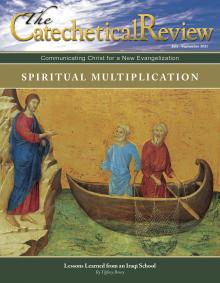 How do you bring someone to faith in Jesus Christ? As Christians, this is a question we should have a ready-made answer for. Whatever our response, we cannot withhold that Jesus Christ is God, that he is a person, and that he is alive. We need to introduce people to faith not as a concept or doctrine but rather as a profound and personal meeting with the risen Jesus.[1]
How do you bring someone to faith in Jesus Christ? As Christians, this is a question we should have a ready-made answer for. Whatever our response, we cannot withhold that Jesus Christ is God, that he is a person, and that he is alive. We need to introduce people to faith not as a concept or doctrine but rather as a profound and personal meeting with the risen Jesus.[1]
Yes, we desire people to know the faith, but primarily we desire people to encounter Jesus and enter into a relationship with him because, ultimately, “the faith has not been transmitted unless the Person and the relationship at the center of the faith have been transmitted.”[2]
Pope Francis stresses this crucial point:
Christ is alive! We need to keep reminding ourselves of this, because we can risk seeing Jesus Christ simply as a fine model from the distant past, as a memory, as someone who saved us two thousand years ago. But that would be of no use to us: it would leave us unchanged, it would not set us free. The one who fills us with his grace, the one who liberates us, transforms us, heals and consoles us is someone fully alive. He is the Christ, risen from the dead, filled with supernatural life and energy, and robed in boundless light.[3]
More than beautiful teachings, Christ offers us his very self. He is a living person, and we can have a real relationship with him. We can’t have a relationship with reason, deductive arguments, a concept, or an idea. But we can have (and in fact, we are made for) a relationship with a personal God.
Pope Benedict XVI emphasizes, “Being Christian is not the result of an ethical choice or a lofty idea, but the encounter with an event, a person, which gives life a new horizon and a decisive direction.”[4] The Christian faith is not an idea, but a life lived with Christ, and the person who lives and is committed to this new life is called a disciple—one who repents, believes, and follows Jesus Christ.
Discipleship is what we are talking about when we talk about spiritual multiplication. How do we form people in such a way that they do not just accept the Christian worldview but make an intentional commitment to follow the living Jesus? In short, how do we make disciples?
What Discipleship Is Not
In order to further illuminate what we mean by discipleship, it might be helpful to identify what discipleship is not.
Baptism and attendance at Mass does not automatically make someone a disciple. Nor does the reception of the sacraments guarantee a personal faith or intentional commitment to Jesus. Many Catholics have been sacramentalized (i.e., received the sacraments of initiation) without being evangelized. Just think of the statistics available to us that show the majority of baptized Catholics don’t attend Mass on Sunday or even pray.
Similarly, knowing the faith does not equate to believing or living the faith. Taking someone through catechesis or a theology course does not translate to discipleship. I know university lecturers who have PhDs in Theology who don’t believe or live the faith; “Catechized Catholics are clearly not necessarily evangelized Catholics.”[5]
Although the sacraments are powerful encounters with Jesus (or should be, if we are rightly disposed), and catechesis can greatly aid and nurture a maturing faith, they don’t necessarily ensure an intentional commitment to follow Jesus.
Discipleship is not merely cultural, nor is it the awakening of a general faith (in an abstract higher power etc.). It is faith in the person of Jesus of Nazareth, born of the Virgin Mary, crucified, and risen from the dead.
What Discipleship Is
A disciple is a follower of Jesus Christ; a person who is in relationship with Jesus and has made an intentional commitment to respond to the call of Jesus into newness of life. Christ began his public ministry with the words, “The time is fulfilled, and the kingdom of God is at hand; repent and believe in the Gospel” (Mk 1:15). Discipleship is a lifelong journey of deepening conversion.
With Pope Benedict XVI, I agree that assimilating the Good News into our lives must begin in the confessional,[6] with the real confrontation of ourselves with Christ. Confronting and confessing our sin not only opens the door to grace and transformation but helps us realize the personal and relational aspect of our faith. Disciples are so intimately united with Jesus that our thoughts, words, and actions affect our relationship with him; they can bring unity or discord. Our faith is not just following the teachings of Christ but living a relationship with him that encompasses our whole person.
It’s easy to accept or believe a Christian worldview if it has no impact on your concrete life. But disciples allow themselves to be disrupted, upended, and transformed daily through their ongoing encounters with the Jesus. How do we foster these encounters and make disciples?
Contemplating Our People: Listening and Accompaniment
In order to effectively communicate the Gospel, we need to first understand the people to whom we are ministering. Pope Paul VI reminds us:
Evangelization loses much of its force and effectiveness if it does not take into consideration the actual people to whom it is addressed, . . . if it does not answer the questions they ask, and if it does not have an impact on their concrete life.[7]
Inviting people to a talk or sharing Catholic content without discerning your audience can often fall into the trap of answering questions that no one is asking and neglecting the pressing questions that are on people’s hearts. Before we teach people about the faith, we must invest time in getting to know who they are and what they need. Often, the receptivity to our message of Good News hinges on the quality of the relationships we form.
Pope Francis has stated that the person seeking to evangelize and make disciples “needs to keep his ear to the people” in order to discover what they need to hear. “A preacher,” he says, “has to contemplate the word, but he also has to contemplate his people.”[8] The Gospel cannot be reduced to a formula or equation; the Word of God is always addressed to a someone, not a something. To effectively address someone with the Gospel we need to be prepared to accompany them on their journey of faith. “All this demands on the part of the evangelizer certain attitudes which foster openness to the message: approachability, readiness for dialogue, patience, a warmth and welcome which is non-judgmental.”[9]
Accompaniment is taking someone on “a pilgrimage with Christ to the Father.”[10] Our relationships need to be intentional, personal, and structured. We need to think about our programs, resources, book studies, etc. in terms of discipleship, ordering our activity toward forming disciples. We also need to talk openly about the discipleship journey; “to the extent that we don’t talk explicitly with one another about discipleship, we make it very, very difficult for most Catholics to think about discipleship.”[11] We also need to be explicit in our language about encountering and having a personal relationship with Jesus, as “it is difficult to believe in and live something that you have never heard anyone else talk about or seen anyone else live.”[12]
Programs Don’t Make Disciples, People Do
We are in need of witnesses. More than programs, we need people—people who can witness and share the love of Christ.
The revitalization of faith is thus not ultimately reducible to a program. Before faith can be effectively transmitted by formal pedagogical procedures, it must be manifest as a living personal presence; as the radiation of the Father’s love in the most basic practices and exchanges of human relationships and culture. The heavy lifting of evangelization must take place here, or it will not take place at all.[13]
Building relationships is key for the discipleship journey. The community aspect, so essential for growth and support in the faith, cannot be produced by resources or content.
Programs, resources, etc. are of course wonderful tools in the hands of an evangelizer, but for effective discipleship making, personal relationships are what count. We need to invest our time, take people seriously, listen to their questions, and go on the journey. This may entail reducing the number of large-scale events in order to focus more intentionally on a few prayerfully considered relationships. But spiritual multiplication was the model of Christ himself—who specifically chose and journeyed with twelve disciples. Jesus did have a public ministry and spoke to large crowds, but it was his small group discipleship that was arguably the most effective.
Nathan Costin is a husband and father of three children. He holds a Bachelor's in Theology (ACU), a Grad Cert. in Education—Leading the New Evangelization, and a Masters in Theological Studies (Marriage and Family) from the John Paul II Institute, Melbourne, Australia. He works full time as the Team Leader—Discipleship for the Catholic Archdiocese of Melbourne.
Notes
[1] See John Paul II, Redemptoris Missio, no. 18: “The kingdom of God is not a concept, a doctrine, or a program subject to free interpretation, but it is before all else a person with the face and name of Jesus of Nazareth, the image of the invisible God.”
[2] Sherry Weddell, Forming Intentional Disciples: The Path to Knowing and Following Jesus (Huntington, IN: Our Sunday Visitor, 2012), 53.
[3] Pope Francis, Christus Vivit, no. 124.
[4] Pope Benedict XVI, Deus Caritas Est, no. 1.
[5] Weddell, Forming Intentional Disciples, 126.
[6] Pope Benedict XVI, address, March 9, 2012, Rome.
[7] Pope Paul VI, Evangelii Nuntiandi, no. 63.
[8] Ibid., no. 154.
[9] Pope Francis, Evangelii Gaudium, 165.
[10] Ibid., no. 170.
[11] Sherry Weddell, Forming Intentional Disciples, 56.
[12] Ibid., 57.
[13] Conor Sweeney, Abiding the Long Defeat: How to Evangelize Like a Hobbit in a Disenchanted Age (New York: Angelico Press, 2018.), 24.
This article originally appeared on pages 38-39 in the print edition.
Art Credit: Public domain image from Pexels.com.
This article is from The Catechetical Review (Online Edition ISSN 2379-6324) and may be copied for catechetical purposes only. It may not be reprinted in another published work without the permission of The Catechetical Review by contacting [email protected]

















